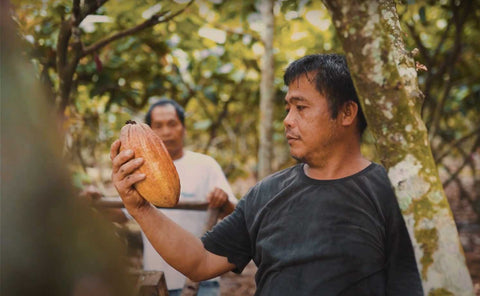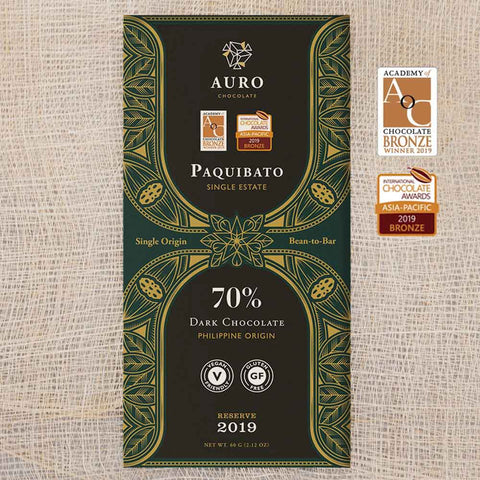As with any great story, a chocolate story goes back to its original protagonists - the cacao and the humans who harness its remarkable qualities.
A personal crisis turned personal passion
Eleven years ago, Jackie Go (mother of Auro's cofounder, Kelly), found herself in a midlife crisis. Going through a spiritual journey, Jackie stumbled upon an old heirloom cacao variety unknowingly growing in the Philippines’ backyards, particularly in Davao, in the southern island of Mindanao.

Fueled by this new information, Jackie went into a research frenzy, asking guidance from friends and tapping local farmers oblivious that they had the prized possession.
But her husband who initially told her to stop pursuing her cacao passion after a failed attempt to launch her chocolate, flew himself down south and had a chance encounter with a cacao worker on his last day to be employed.
Out of compassion, Jackie’s husband told the worker right then that he will work for his wife. And upon returning to Manila, he fulfilled his promise to the cacao worker and they reopened their cacao venture.
Passing it on
Everything soon fell into place when Jackie’s daughter, Kelly, who was educated in Chicago thereafter attended Le Cordon Bleu Paris, decided to come home and take an interest in cacao.
Convinced that there was more to Filipino cacao, cofounders Kelly Go and her best friend Mark Ocampo, who worked in advertising in Chicago at that time, both noticed that Askinosie, one of the top bean-to-bar chocolate makers in the United States actually uses cacao from Davao in their bars.
That’s when they finally had the eureka moment that it was time to finally come home to the Philippines.
Journey to a rare discovery
Kelly and Mark thereon had been travelling down south from Manila to Davao and met up with many farmer groups.
They discovered something much more rare in Davao—the heirloom Criollo Porcelana, which only makes up 0.1% of the world’s cacao production.

The friends also discovered how the Philippines are unique in Asia in terms of chocolate consumption.
“We are very much like South America. We drink cacao as tablea (ground cacao nibs) while our neighboring countries in Asia don’t consume it, they just export it.
Isn’t it great and unique that we have this long tradition in the Philippines?” Kelly conveyed.
Problems at the farms revealed
“When my mom first started going around, they met a lot of farmers who would cry once they knew what they had,” Kelly recalled.
With the lack of knowledge of cacao’s rich history and value, it was but understandable how many cacao farmers had been cutting down precious cacao trees to make way for higher-yielding varieties.
No sorting, low quality, less earnings for the farmers
One of the first major problems they also saw was there was no distinction as to bean quality. All cacao beans, with no regard as to type, origin, or variety, were combined, weighed, bagged, then sold to traders.
Second, farmers lack the know-how on fermentation and drying so this is done by traders who jack up the prices of cacao and make more money than the farmers.

Direct partnerships for a better cacao quality
So Mark and Kelly, as they partnered with co-ops and individual farmers, created a technical support team that helps educate farmers on drying and fermenting the beans and in improving the overall quality of cacao.
Auro continues to buy directly from farmers, creating a pricing scheme that encourages the production of quality beans.

For every ton of cacao, they do a random sampling of 500 beans. The lower the number of defective beans, the more the farmers earn, encouraging the production of better quality cacao.
Auro also offers programs on organic farming methods, proper post-harvest practices, and farm business management to enable their cacao partners to make a positive impact to their communities. Auro also celebrates their achievements by giving them and their communities improved visibility and recognition.
Read more why Auro is more than an oridinary bean-to-bar maker
Giving Back to help build the Philippine’s cacao industry
Mark Ocampo said it is something bigger.
“We want to give back to the farmers because we wanted to stop the abuse of agricultural relationships; we want to support the community and empower the farmers so that they can experience an improvement in their livelihood.”
It gives us further encouragement that we can stand with the best on the global stage, and that we need to keep persevering so that we can make an even greater contribution to the sustainable development of the fine cacao and chocolate industry,” Kelly added.
 Auro Chocolate 70% Dark Paquibato Single-Estate is made from beans which won the Top 20 Best Cacao Beans in the World in 2019 Cocoa Excellence Awards in Paris, France.
Auro Chocolate 70% Dark Paquibato Single-Estate is made from beans which won the Top 20 Best Cacao Beans in the World in 2019 Cocoa Excellence Awards in Paris, France.
Now you understand how every bar of Auro chocolate, made through direct partnership between maker and farmer, has become one of the world's excellent chocolate.
Don't forget to check Auro Chocolates from our online store in Sweden or give them as a memorable gift.
Source: www.aurochocolate.com/blogs

